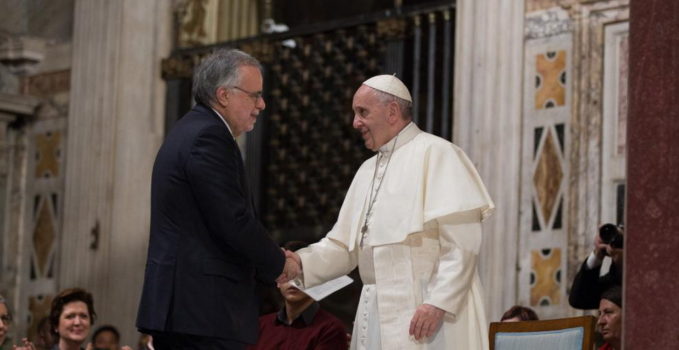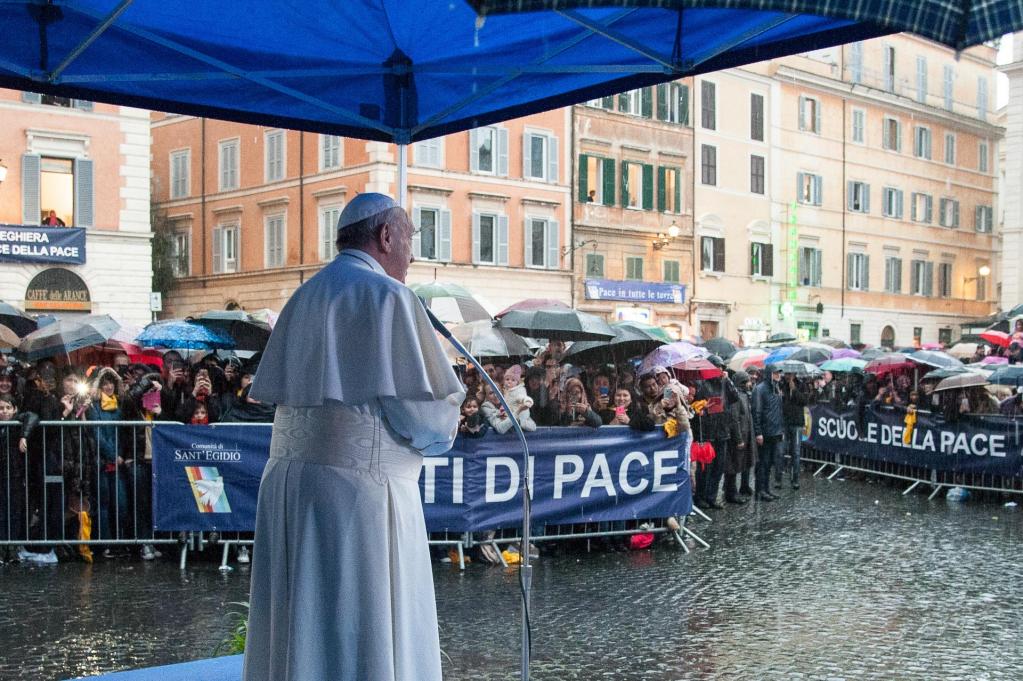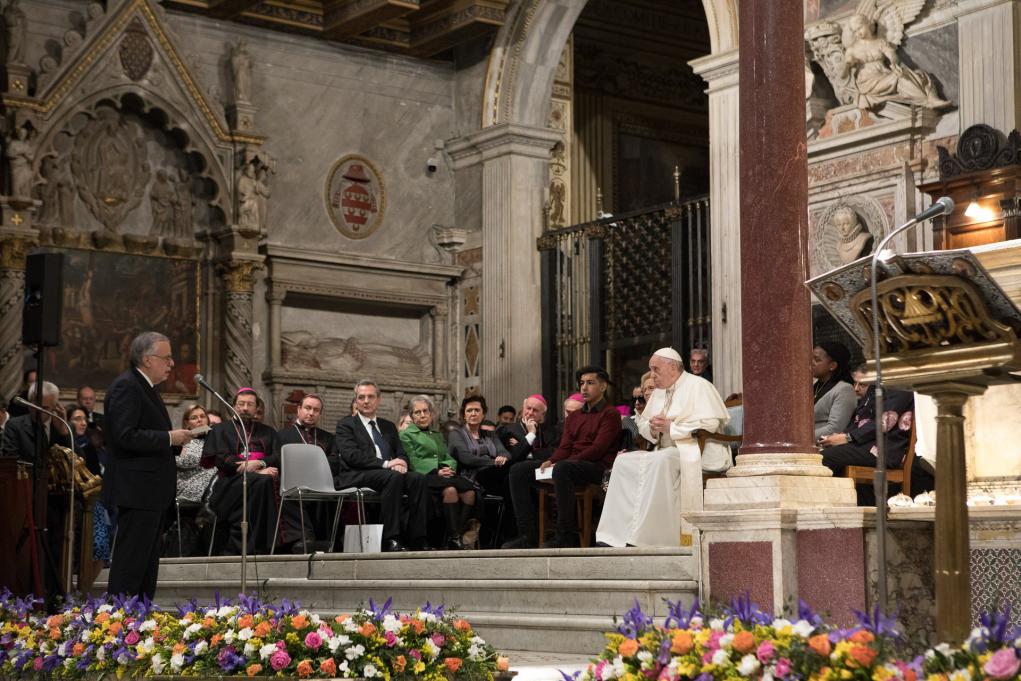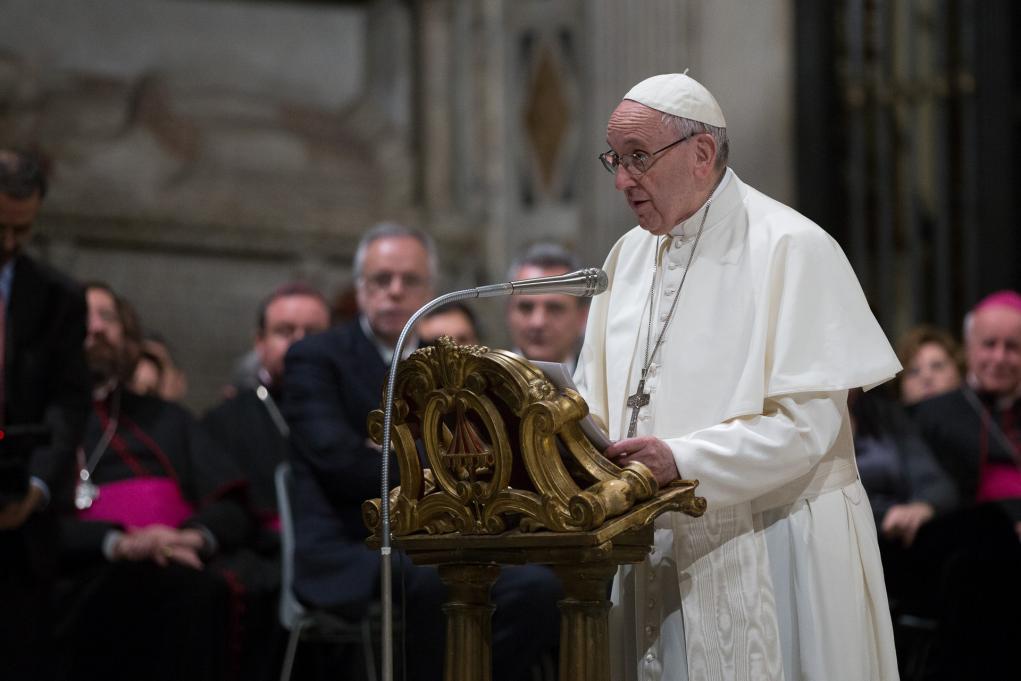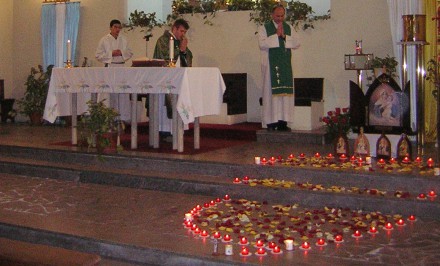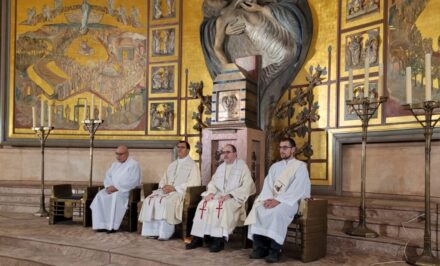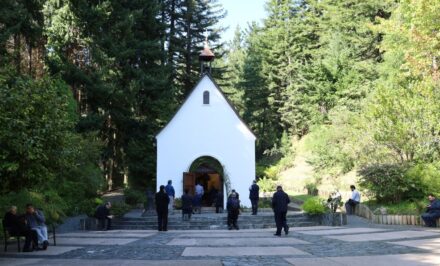ITALY/UNIVERSAL CHURCH, Schoenstatt.org with the Sant’Egidio Press Office •
“Dear friends, thank you very much for your friendship and affection. We are sending you the German translation of the address by Pope Francis and Prof. Andrea Riccardi on the 50th anniversary of the Sant’Egidio Community.” This was the message sent to Schoenstatt.org by Cesare Zucconi, the Secretary General of the Sant’Egidio Community on the morning of 13 March, on the fifth anniversary of Pope Francis’ election. “The poor are your treasure,” is the central focus of Pope Francis’ message. That is true and the Pope’s message to this young 50-year old movement, from the Church’s “1968 generation” is also a treasure, for Schoenstatt as well. Thank you for sharing! —
It was a well-attended celebration despite the Roman rain that welcomed Pope Francis on Sunday 11 March at Santa Maria Square in Trastevere. His visit to celebrate the 50th anniversary of Sant’Egidio was greatly anticipated by all of the generations that now belong to the Sant’Egidio Community. Among the thousands of people who filled the square and the Church, several thousand more in dozens of parishes followed the live transmission on the Sant’Egidio website.
It was a time, “not to look backwards with a celebratory style to rejoice for some success,” said Andrea Riccardi who founded this community 50 years ago as a young student, but “rather to look forward.” The Holy Father spoke about the audacity and courage, and the mission that this community has and should carry more than ever today. “Since your Community was born, the world has become “global”: economy and communications have, so to speak, “unified”. But for many people, especially the poor, new walls have been lifted. Diversity is an occasion for animosity and conflict; a globalization of solidarity and of the spirit still awaits to be built. The future of the global world is living together: this ideal calls for the commitment to build bridges, to keep dialogue open, to continue and meet with one another…A mission to patiently weave together again the human fabric of the peripheries that violence and impoverishment have torn apart; a mission to communicate the Gospel through personal friendship; to show how life truly becomes human when it is lived beside the poor; a mission to create a society that considers no one a foreigner. It is the mission to cross borders and walls, to join together. Today, more than ever, carry on audaciously on this path.”
Words of greeting by Andrea Riccardi at the Sant’Egidio Community on 11 March 2018
Holy Father,
Thank you for your presence among us.
For the 50th anniversary of the Community, as you know, we preferred not to look backwards with a celebratory style to rejoice for some success, rather to look forward. It is not the case to plan projects that history punctually upset but to look at those who are coming towards us, those in need of our help today, while listening to the open questions. Which is to recognize from where life and history are coming from.
Times have changed since the ’68 where our origins lays. Whole words have disappeared, like the easts regimes and the revolutionary powers of utopia; the new words of the south lost their hopes of being new and have experienced war. Everything has become global, like a large and waste market. Nevertheless, it seems that very little has changed in the powers holding history – like money, as You often mentioned.
Is it impossible to change the world today?
Someone says that our global age is complicated. First of all we have to survive, protecting ourself from the others, particularly for the poor. That is the logic of thinking on oneself shifting from personal egocentrism to national selfishness. Every country needs to lock itself in to be save from the ton of the word.
One can feel afraid as if he/she was a victim. We are experiencing forms of widespread rage: against the others, the different ones, the poor, the assumed enemies. We live in a painful age with endless violence and wars: like in Syria and South Sudan. Violence is crouched at the door of every society. So is the temptation of pessimism which comes with closure and indolence.
Is it really possible for the friends of the risen one to be pessimistic? St Augustine says: “And you say. These are difficult times … Live well and, with a good life, change the times: change them and you will not have to complain any longer!” (Sermo 311,8).
From the ’68 and surroundings years, we cherish the certainty that everything can change – depending on us too.
The Vatican Council gave us the Word of God, which enlightens hearts and minds. It lights up the path, while increasing our faith. Even when it’s dark. We can move forward even in the darkness! This frees us from the risk of reverence turning men and women into little ones: frightened, greedy, clerical and conservative.
Judith, the woman who weakened the arrogant with her beauty, taught: “whoever fears the Lord is always great” (16:16). To be great: it is accepting the challenge of making the world a better place. With bare hands and the Word: these are the most excellent tools we can possibly have, the one of the Gospel: “Then my poor raised the cry of war – says Judith – … my weak raised the cry and those were upset” (ibid. 11). It is the strength of the humble and the poor.
What I wish to say now – not to congratulate but to tell you the truth – is that since you urged us, with the Evangelii Gaudium, to get out on the street and to overcome institution, sacristies, pastoral plans, self-referentiality, egocentrism, leaving our purity at the side, well since then a great people has set off. We found many people wanting to do good. We came across resources and energies; not anger alone, on the contrary a lot of love. And this gives us hope and joy.
With this prospect, Sant’Egidio does not feel as a community of perfect ones (how could we?), rather as a community of people, maybe small but with no borders thanks to profound connections with both the near and distant sorrows. Anger and self-love can be healed. It happens when we go towards the others with sympathy, justifying hope and promoting the encounter with the poor, who are real masters of the truth of life. This is the joy of the Gospel that we experience. The age of anger can turn into the age of fraternity and spirit.
You told us in Assisi in 2016: “we believe and hope for a brotherly world”.A simple but decisive dream. You added: “Our future is to live together. This is why we are called to free ourselves from the heavy burdens of mistrust, fundamentalism and hatred “. Not an impossible agenda but a request that comes from the groaning of the poor, the peoples and the earth. Our prayer is harmonized with these moans, here in this basilica and in every place where we are. Living together for a fraternal world, among peoples, in the suburbs and in the city, is actually a possible revolution, if we start from the heart and the Gospel. As our orthodox theologian friend Olivier Clément once said: “the only creative revolutions in history arise from the transformation of hearts”.
The Church, mother of hope, strengthen us. And you too, Holy Father, with your teaching since five years.
Christ, who from the top of the mosaic is looking at us with his tender eyes while embracing his Mother, makes all of this possible. Thank you!
Translation: Press Office Sant’Egidio
Address by Pope Francis to the Sant’Egidio Community: Today, more than ever, carry on audaciously on this path
Off the cuff remarks
Good evening… not so good one! Doc Impagliazzo said that Rome has its doors open, but even the sky as its own doors open and we are all getting wet from the water pouring down. But still, always with open doors! Thank you for coming today. Thank you for presence and generosity. Here lays generosity, and the open heart. An open heart for everyone, everyone, everyone! Without any kind of distinctions: “ this one I like, this one I don’t. He is a friend, he is an enemy …” No. Everyone, everyone! With the heart open to everyone. This is what makes life moving forward. I thank you very much and I wish you all the best, to each and every one of you, to your families, and also to your dreams. May the Lord bless you. And pray for me. Thank you.
Address of the Holy Father in the Basilica of Santa Maria in Trastevere
Dear friends,
Thank you for your welcome! I am happy to be here with you for the fiftieth anniversary of the Community of Sant’Egidio. From this square, in front of the basilica of Santa Maria in Trastevere, the heart of your evening prayer, I wish to embrace all your communities scattered around the world. I greet you all, particularly Professor Andrea Riccardi, whose inspired intuition initiated this path, and President Professor Marco Impagliazzo, for his words of welcome.
You did not wish to make this day a mere celebration of the past, but rather and above all a joyful expression of responsibility for the future. This calls to mind the evangelical parable of the talents, which tells of a man who “going on a journey, summoned his slaves and entrusted his property to them” (Mt 25,14). To each of you, too, whichever your age may be, is given at least one talent. On this talent is inscribed the charisma of this community, which I synthesized with these words when I came here in 2014: prayer, poor and peace. And I added: “As you walk this path, you help compassion grow in the heart of society — which is the true revolution, that of compassion and tenderness — to cultivate friendship in place of the ghosts of animosity and indifference” (Meeting with the Community of Sant’Egidio, 15th June 2014: Teachings II, 1 [2014], 731).
Prayer, poor and peace: this is the talent of the Community, which has matured over fifty years. You joyfully receive it anew today. In the parable, however, one of the slaves hid the talent in a hole in the ground, and justified himself in these terms: “I was afraid, and I went and hid your talent in the ground” (v. 25). This man was unable to invest the talent in the future, because he allowed himself to be counseled by fear.
The world today is often inhabited by fear. It is an ancient disease: the call not to be afraid often recurs in the Bible. Our time experiences great fear as it faces the vast dimensions of globalization. And fear often turns against people who are foreign, different, poor, as if they were enemies. So then we defend ourselves from these people, and we believe we are preserving what we have and what we are. The atmosphere of fear can infect also those Christians who hide the gift they have received, like the slave in the parable: they do not invest it in the future, they do not share it with others, they preserve it for themselves.
When we are alone, we are easily the victims of fear. But your path directs you to look at the future together: not alone, not by yourselves. Together with the Church. You have benefited from the great impulse to community life and to being people of God that came from the 2nd Vatican Council, which stated: “God, however, does not make men holy and save them merely as individuals, without bond or link between one another. Rather has it pleased Him to bring men together as one people” (Dogm. Const. Lumen gentium, 9). Your Community, born at the end of the Sixties, is a daughter of the Council, of its message and of its spirit.
The future of the world seems uncertain. Look at how many open wars there are! I am aware that you pray and work for peace. Let us think of the sorrows of the Syrian people, whose refugees you have welcomed in Europe through the “humanitarian corridors”. How is it possible, after the tragedies of the twentieth century, to fall back into the same foolish scheme? But the Word of the Lord is light in the darkness, and it gives hope for peace; it helps us not to be afraid even in front of the power of evil.
On this stage you have written the words of the Psalm: “Your word is lamp to my feet, and a light to my path” (119,105). We have celebrated the coming of the Word of God among us. With this same spirit you have welcomed what I proposed to every community at the end of the Extraordinary Jubilee of Mercy (cf Ap. Lett. Misericordia et misera, 7). The Word of God has protected you in the past from the temptations of ideology, and today it delivers you from the intimidation of fear. For this reason I exhort you to love the Bible, and spend increasingly more time it. Everyone shall find in it the source of mercy for the poor, and for those who are wounded by life and war.
The Word of God is the lamp we look at the future with, even the future of this Community. In his light we can read the signs of the times. The blessed Paul VI said: “in our eyes the world is made into a book” (General Audience, 16th April 1969: Teachings VII, 1969, 919). A book to read with the eyes and heart of God. This is the spirituality that springs from the Council, which teaches profound and attentive compassion for the world.
Since your Community was born, the world has become “global”: economy and communications have, so to speak, “unified”. But for many people, especially the poor, new walls have been lifted. Diversity is an occasion for animosity and conflict; a globalization of solidarity and of the spirit still awaits to be built. The future of the global world is living together: this ideal calls for the commitment to build bridges, to keep dialogue open, to continue and meet with one another.
It is not only a political or organizational issue. Everyone is called to change his or her heart, acquiring merciful eyes to look at the others, turning into artisans of peace and prophets of mercy. The samaritan of the parable took care of the half dead man on the road, because “when he saw him, he was moved with pity” (Lk 10,33). The samaritan had no specific responsibility towards that wounded man, and he was a foreigner. But he behaved like a brother, because his eyes were merciful. Christians, by their very vocation, are brothers and sisters to every person, especially the poor, even though a person may be their enemy. Never say “I have nothing to do with this”. Merciful eyes commit us to living the creative audaciousness of love, and there is so much need of it! We are everyone’s brothers and sisters, and for this reason we are prophets of a new world; and the Church is a sign of the unity of the human race, among nations, families and cultures.
I wish this anniversary to be a Christian anniversary: not a time to assess results or difficulties; not a time of balances, but a time when our faith is challenged to turn into a new audaciousness for the Gospel. Audaciousness is not the courage of a day, it is the patience of a daily mission in the city and in the world. A mission to patiently weave together again the human fabric of the peripheries that violence and impoverishment have torn apart; a mission to communicate the Gospel through personal friendship; to show how life truly becomes human when it is lived beside the poor; a mission to create a society that considers no one a foreigner. It is the mission to cross borders and walls, to join together. Today, more than ever, carry on audaciously on this path. Carry on standing at the side of the children of the peripheries, with the Schools of Peace that I have visited; carry on being at the side of the elderly: sometimes they are discarded, but to you they are friends. Carry on opening new humanitarian corridors for the refugees of war and hunger. The poor are your treasure!
The apostle Paul writes: “So let no one boast about human leaders. For all things are yours […] and you belong to Christ, and Christ belongs to God” (1 Cor 3, 21.23). You belong to Christ! It is the sense that is found in the depths of your history to this day, but above all it is the key to face the future. Always belong to Christ in prayer, in caring for his little brothers and sisters, in seeking peace, for He is our peace. He will walk with you, he will protect you and guide you! I pray for you, and you pray for me. Thank you.
Translation by Sant’Egidio
All the texts of Pope Francis’ visit
Original: Spanish, 16 March. Translation: Sant’Egidio website/Sarah-Leah Pimentel


